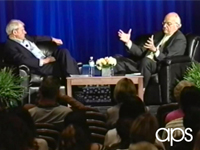Eating into the Nation’s Obesity Epidemic
“What product does the slogan ‘Melts in your mouth, not in your hand’ belong to?” Kelly Brownell challenged his listeners. They chuckled and shouted in unison “M&Ms.” The audience hadn’t expected a pop quiz when coming to hear Brownell’s invited address, “Changing the American Diet: Real Change Requires Real Change,” at the APS 18th Annual Convention. Next came “They’re Grrreat!,” “I’m lovin’ it,” “Break me off a piece of that …,” and finally “I go cuckoo for …” Of course, the audience knew every one. But they couldn’t answer one question, what departments create the federal government’s nutrition guidelines and, most importantly, what are they? “Well,” answered Brownell, an APS Fellow from Yale University, “The real question is who has done your nutrition education? And most startlingly, who will do the nutrition education of your children? There’s no question that the answer is the food industry.”
With that, Brownell, who is among this year’s Time 100, a list of people whose actions and ideas influence the world, began his introduction into the reality of nutrition in America. As the quiz shows, “little effort goes in on the government’s part to show people how to eat in a healthy way.” Meanwhile the food industry bombards us with messages about cheap, tasty processed foods, which are, of course, high in sugars and fats. People are broadly trained that fruits and vegetables are good for them, but many Americans also believe sugary cereals are part of a nutritious breakfast and any drink with fruit in its name is healthy.
Over the last few decades, America has experienced an “absolutely startling increase [in obesity]. Pandemic or epidemic is not overstating the situation.” Some see this as a failure of personal responsibility, but evidence suggests that something larger in the environment is spurring this trend. There is no evidence to suggest that we are less responsible eaters than our grandparents. Studies of developing nations show that when packaged foods such as soft drinks and snack foods replace traditional diets, obesity increases. The obesity epidemic could feasibly have a genetic or biological basis, but then why has it happened so quickly and recently when the gene pool has not changed? Recent studies about the economy of food give some insight into the food landscape. Five factors influence food choice: accessibility, convenience, taste, promotion and cost. Unhealthy foods win out on all five. They are more accessible, more convenient, tastier, more heavily promoted and cheaper. No wonder we all eat so badly.
What Psychological Scientists Can Do
So, what roles can psychology play to alleviate this crisis? Many people jump to say that psychology could help with clinical interventions of the already obese, but sadly, the only treatment with impressive results for obesity is surgery, which is too costly and invasive to be a viable solution for treating the vast number of obese people in America today. Clinical treatments also ignore the larger public health issue. According to Brownell, treating obesity without looking at the broader health issues would be like treating lung cancer without addressing the fact that smoking causes lung cancer. “For every case we successfully treat,” said Brownell, “thousands more are created because of the environment.” According to him, a social movement against unhealthy eating, similar to the movement against tobacco, is the only way to improve the way America eats.
To be effective, psychologists must change their thinking and make novel connections with people outside their field. Researchers should also realize that they may have more influence than politicians because they are not caught in political messiness (some would say quagmire) between the government, the food industry, subsidies and giant agribusiness.
Brownell outlined several key research questions that psychologists will be instrumental in answering. In a broad sense, psychologists can investigate the behavioral economics of food – why do people make the eating decisions that they do?
Psychologists should investigate attitudes about food supply and processing. Over the last several decades, there was an increasing distance from food sources to our tables. Food moved from coming from the ground or an animal to coming from the super market or vending machine and is now often filled with ingredients whose names we can’t pronounce and whose chemical effects are not completely understood. How does this affect consumption and health? In addition, Americans seem to have an ingrained “more for less is good” value when it comes to food, as has been dramatically exploited by the “supersize it” marketing campaigns at fast food restaurants and ballooning portion sizes (Super Big Gulp, anyone?). The quest for value clearly affects what and how much we eat.
A related issue is marketing. How does promotion affect food choice, particularly among children? As shown by the quiz at the beginning of the talk, food marketing is highly effective. We all know the jingles and take them with us all the way to the supermarket aisle. Brownell asks whether we can equate the food industry’s kid friendly advertising (Ronald McDonald, Tony the Tiger, Tucan Sam, and others) to the cigarette industries’ now infamous advertising campaigns aimed at children. This advertising could have life-long impacts on food choice.
Finally, can food be addictive? Clearly, most severely obese individuals have a toxic relationship with food. What causes the cravings and the inability to stop when one has gone from nourishing her or his body to killing it?
How can this cycle be stopped? What about food enhanced with sweeteners? High fructose corn syrup may be metabolized differently than other foods, creating unforeseen effects on bodies as well as minds. Addiction research could change the whole political landscape by changing how we think about eating as a simple choice.
Brownell offered a challenge to the audience and the broader public with five action steps: foster a social movement for nutrition, emphasize strategic science, target frequent contributors to obesity (starting with soft drinks), transform the economics of food, and pressure politicians to change the way Americans are educated about nutrition. Maybe then we would know the answers to all the questions in Brownell’s pop quiz.




Comments
This is not just happening in America, it’s happening everywhere. Here in Thailand there is a rapid development from traditional foods (which are mostly fresh prepared from “real” ingredients) to processed foods. With it comes a staggering increase in obesity. I can’t think of a simple solution to this problem. When you preach to people that processed foods aren’t good, it often doesn’t change their food choices. And the incentives are just stacked in a way that favor those companies that make money out of bad foods, rather than people who want others to make better food choices.
APS regularly opens certain online articles for discussion on our website. Effective February 2021, you must be a logged-in APS member to post comments. By posting a comment, you agree to our Community Guidelines and the display of your profile information, including your name and affiliation. Any opinions, findings, conclusions, or recommendations present in article comments are those of the writers and do not necessarily reflect the views of APS or the article’s author. For more information, please see our Community Guidelines.
Please login with your APS account to comment.